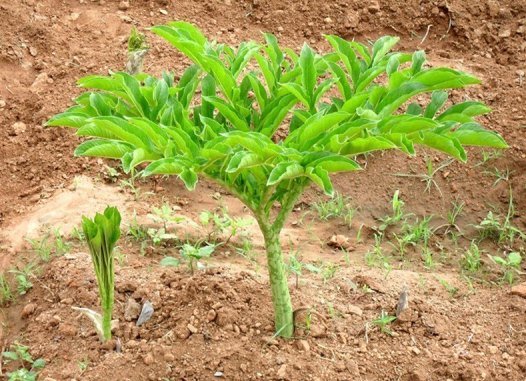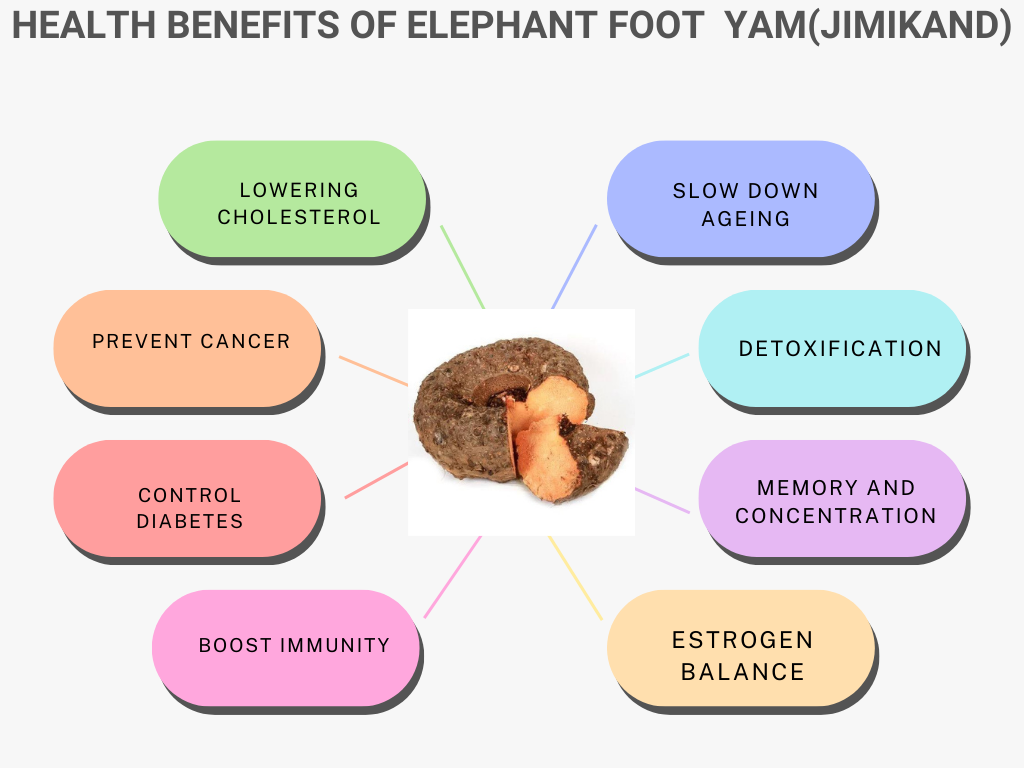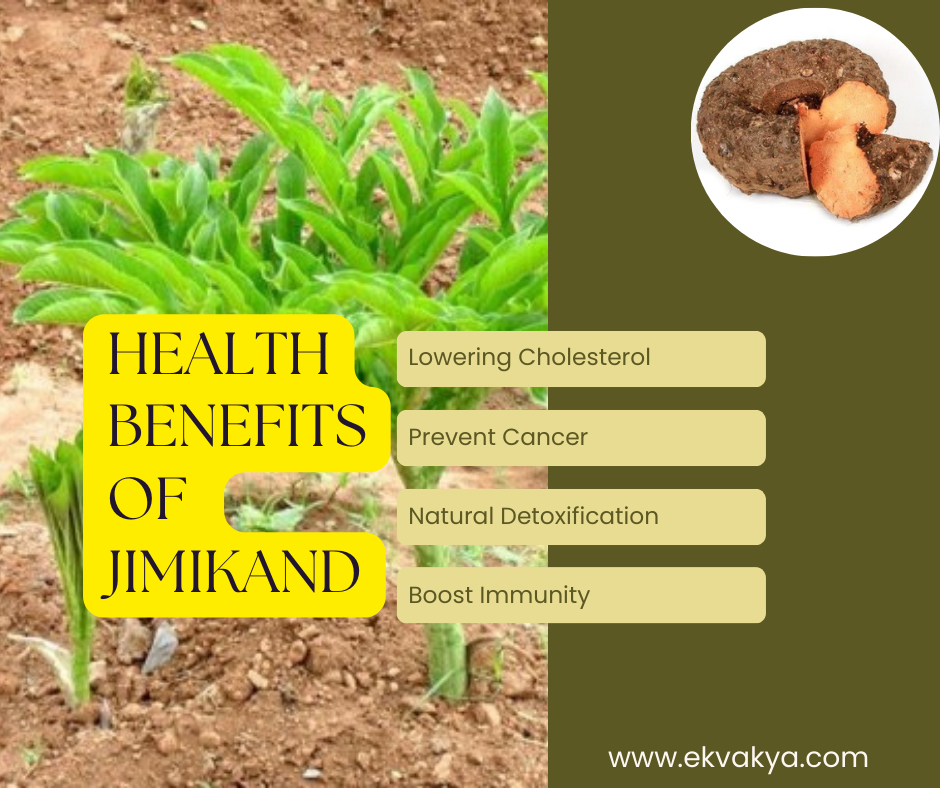What is Elephant Foot Yam (jimikand)?
It a type of vegetable, commonly found in the Southeast Asia, South Asia & Africa. In India it is found in the all-region, but people known as with different names. It most likely found in Jharkhand, Bihar, Chhattisgarh, Andhra Pradesh, Assam, Gujarat, Kerala, Madhya Pradesh, Maharashtra, Manipur, Meghalaya, Mizoram, Nagaland, Tamil Nadu, Odisha and Tripura so on states. Its plant blooms annually around the beginning of rainy season. It bears a purple inflorescence and secretes a pungent mucus to attract pollinating insects. The insects are trapped within the flower to allow pollen transfer to stigmas. After pollen deposition, the female flowers develop bright red berries.
It is commonly Ool, suran, zimkand & elephant foot yam stinky lily and telinga fruit. It is a tropical tuber vegetable. The botanical name is Amorphophallus Paeoniifolius. The tuber of this plant has high medicinal value used as a cash crop & consumed as food by many people.
Most of us people like it but most of people does not like it because of its itching properties. But very few us know about its medicinal values of Zimikand.

Jimikand also known as Yam, is a starchy root vegetable originating from South Asia. The vegetable is nutritious and packed with essential nutrients, vitamins, and minerals that are essential for maintaining a healthy lifestyle. Jimikand is an excellent source of carbohydrates, dietary fiber, potassium, and Vitamin C, making it an ideal food for promoting overall health.
Eating this at least once in year can full fill the phosphorus quantity in enough manner for the whole year.

Nutritional Value of Elephant Foot Yam (Jimikand) Plant
• It contains plenty of carbohydrates and proteins making it a good staple food. Its other chemical constituents are beta-sitosterol, xylose, lupeol, galactose, betulinic acid, amylase, stigmasterol and much more. It also contains high levels of zinc, phosphorous, potassium, vitamin B6, calcium, vitamin A and others
• Some other important constituents of elephant foot yam plant are steroids, phenols, alkaloids, flavonoids, and amblyone. Containing about 5% of proteins, 18-24% of carbohydrates, along with about 72% of water, it is a quick energizer and is widely consumed in several parts of the world.
• For 100 grams elephant yam – it contains 95% carb, 1% fat and 4% protein. Elephant foot yam hold Calories around 116(486 kJ)6%, Carbohydrate111(465 kJ), Fat1.2(5.0 kJ), Protein4.1(17.2 kJ)
• Vitamin A122IU, Vitamin C12.1mg, Vitamin D~ ~,Vitamin E (Alpha Tocopherol), Vitamin K2.3mcg, Thiamin0.1mg, Riboflavin0.0mg, Niacin0.6mg, Vitamin B60.2mg, Folate16.0mcg, Vitamin B120.0mcg, Pantothenic Acid0.3mg, Choline16.2mg
• Calcium14.0mg, Iron0.5mg3%, Magnesium18.0mg, Phosphorus49.0mg, Potassium670mg, Sodium8.0mg, Zinc0.2mg1%, Copper0.2mg, Manganese0.4mg, Selenium0.7mcg

BENEFITS of jimkand?
• Elephant Foot Yam Acts as Lowering Cholesterol Agent: Elephant foot yam is known to have a great effect in lowering the levels of bad cholesterol in the body. It is extensively used as a slimming food. Omega-3-fatty acids present in it helps in increasing the levels of good cholesterol in the body, while reducing the levels of low-density lipoproteins and very low-density lipoproteins. Elephant foot yam vegetable contains very low about 0.2-0.4% of fat and high levels about 1.7-5% of fibers, making it an ideal food in the process of weight reduction.
• Anticoagulant and Anti-inflammatory Properties of Elephant Foot Yam: As an effective anticoagulant, elephant foot yam can be helpful in reducing the risks of heart attacks. It also helps in relieving the clots formed in arteries and veins. This action can also be helpful in reducing high blood pressure and further complications like coronary artery disease.
• Add Elephant Foot Yam In Diet to Prevent Cancer: Not only Omega-3-fatty acids and antioxidants but also the compound Diosgenin is said to be very effective in preventing the formation of cancerous cells. This constituent of elephant foot yam also helps in improving the immune system to combat cancer formation in the body.
• Slow Down Ageing Agents in Elephant Foot Yam: The powerful antioxidants present in elephant foot yam vegetable is said to be effective in slowing down the aging process. It also helps in keeping away risks of cardiovascular diseases, cancer, and strokes. Another important constituent of elephant foot yam is that is that, vitamin C also aids in slowing down of the aging process. It slows down the process of aging by making one’s skin blemish-free and wrinkle-free.
• Use Elephant Foot Yam Vegetable to Control Diabetes: It is widely recommended in : the diet of diabetic patients because elephant foot yam vegetable low glycemic index, which indicates that it raises blood sugar slowly. Some of its constituents are also known to show insulin promoting action.
• Detoxification Nature of Elephant Foot Yam: Elephant foot yam acts as potent detoxifier. The high fiber content in elephant foot yam shows toxin detoxification in the liver. Elephant foot yam is best known for its hepatoprotective activity. It helps in proper cleansing of other internal organs including intestine and stomach, making them free of pathogens.
• Anti-inflammatory Properties of Elephant Foot Yam Plant: It is also used in the treatment of haemorrhoids and piles. It is also recommended in the treatment of arthritis. It also helps in reducing muscle spasms. Other applications of its anti-inflammatory activity can be found in rheumatism, elephantiasis, glandular swellings and others.
• Consume Elephant Foot Yam Improves Memory and Concentration: Being a rich source of Omega-3-fatty acids and also other essential minerals like zinc, selenium, magnesium, phosphorous, elephant foot yam help in improving brain functioning and aids in the improvement of memory and concentration.
• Elephant Foot Yam Boost Immunity: The fiber contents of elephant foot yam are great supplements for probiotics. It not only cleanses toxins and pathogens out of the body, but also builds up good bacteria to improve immunity. Elephant foot yam is also said to be possessing antibacterial agents which help in keeping away infections. It also shows extensive cytotoxic and immunomodulatory activity.
• Elephant Foot Yam Helps in Balancing Estrogen Level: Elephant foot yam increases estrogen levels in women to maintain hormonal levels. It also helps in reducing the symptoms of the Premenstrual syndrome. Along with other antioxidants, vitamin B6 also helps in relieving pPremenstrual syndrome including abdominal pain and cramps.
• Cooling Effect of Elephant Foot Yam: Elephant foot yam shows a cooling effect in the body. It helps in reducing high blood pressure and also facilitates, smooth flow of blood across arteries and veins. It reduces stress and is highly recommended to be included in the meals especially, in hotter regions for its cooling effect. This can be accounted for elephant foot yam’s nervous system depressant activity, which results in sedation and decreased locomotor activity.
• Consume Elephant Yam to Treat Gastrointestinal Disorders: It is said to be useful in the treatment of irregular bowel movement, especially in case of constipation. Elephant foot yam is also helpful in treating diarrhea, dysentery and maintains a good health across the gastrointestinal tract by supplementing probiotics.

Side-Effects & Allergies of Elephant Foot Yam (Jimikand)
The cooling effect of elephant foot yam is contraindicated in patients who are suffering from asthma, bronchitis, sinus infections or cold. The conditions might get worse, the reason it is advisable, that patients should avoid foot yam. The vegetable is also quite itchy in nature, and on having it, one can feel itching sensation in their mouth and throat. Even pregnent women can eat elephant foot yam during pregnancy period, it offers no side effect their mother health.
Why do we eat jimikand or suran or ool on Diwali?
On the occasion of Diwali, many delicious dishes are prepared in the Indian houses. Many people like to eat Jimikand vegetable, also known as Suran on Diwali. In most of the houses, there is a tradition of making Suran curry on the night of Diwali. People often eat their favourite dishes during festivals. But making Jimikand vegetables on Diwali night is directly connected to this festival. Despite having the option of cooking several other delicious dishes on the day of Diwali, people do not forget to eat Jimikand vegetable. However, do you know the real reason for making Jimikand vegetables on Diwali? Also, are you aware of the benefits of eating Jimikand?
Reason behind cooking Jimikand vegetable on Diwali
Consuming Jimikand on Diwali is considered very beneficial for health. According to beliefs, eating Jimikand on Diwali brings happiness and prosperity to the house. The fruit of Jimikand grows again even after cutting it from the root. Due to this it is associated with happiness and prosperity of the families.

